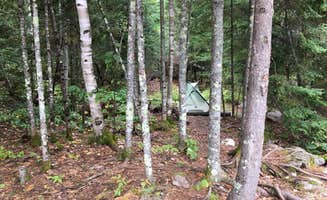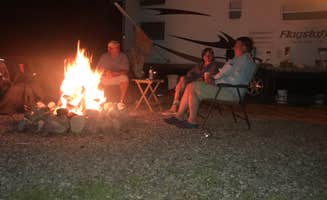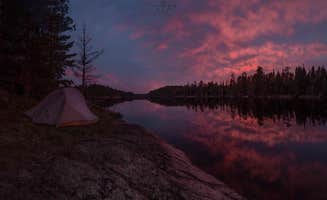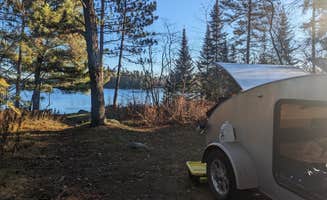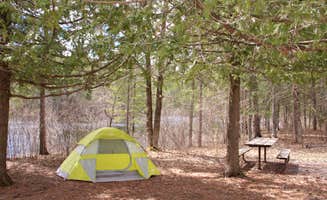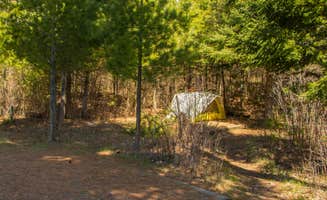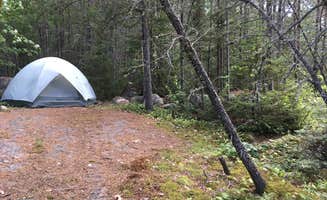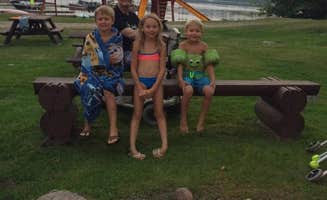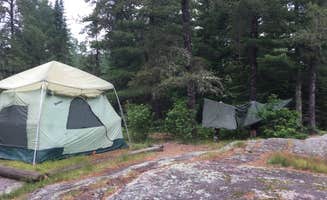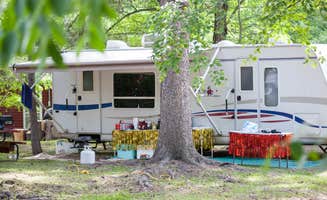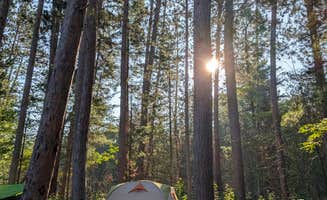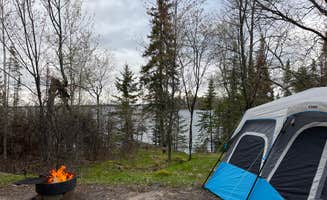Crane Lake camping sites provide direct water access to Superior National Forest, the Boundary Waters Canoe Area Wilderness, and Voyageurs National Park. The area sits at approximately 1,140 feet elevation with a northern continental climate featuring summer temperatures averaging 65-75°F during peak camping season. Winter access becomes increasingly limited after mid-October when temperatures regularly drop below freezing and many water-dependent sites close.
What to do
Fishing on Mukooda Lake: Access this ecologically unique lake within Voyageurs National Park via water taxi from Crane Lake Primitive Campgrounds. "There is a unique subspecies of lake trout found here that is found nowhere else in the world; also, the lake has a unique substrate and hydrology and is very pristine," notes a visitor.
Hiking at Lake Jeanette: The 1-mile loop trail around Lake Jeanette Campground offers rocky terrain and lake views. "There was a HUGE boulder the size of a small house in our buddy's site that blocked the wind so it was great," reports a camper about the geological features.
Blueberry picking: July through August, wild blueberries grow abundantly around campsites. "We come up to pick fresh blueberries, and spend time on the lake. Many memories have been made at this camp ground," shares a visitor at Echo Lake.
Visit historical sites: The area contains remnants of Civilian Conservation Corps camps from the 1930s. "Little bits of evidence are around if you look for them," notes a camper about Lake Jeanette, while another mentions that "the nearby historical site added a fun and educational touch to our trip" at Woodenfrog.
What campers like
Privacy between sites: Woodenfrog Campground receives consistent praise for site spacing. "The sites are very big and private. There is beach and dock access and the lake itself is beautiful," explains one reviewer, while another notes "there are a few sites in the back of the loop (38, 36, 33) that are really nice with lake views."
Stargazing opportunities: Light pollution is minimal at remote sites. "The stars are incredibly bright at night. Plenty of hiking trails and great for fishing walleye," reports a visitor at Echo Lake campground.
Island camping: Indian Island Canoe Campsite provides a unique experience. "The site has a fire ring with grate, picnic table, plenty of trees for hammocks, and a small tent pad that would be good for a three or four person tent. There's also a primitive toilet so you don't have to dig a cat hole!"
Wildlife viewing: Multiple species can be spotted from campsites. "Lots of deer around, walking right thru our site," notes a camper at Woodenfrog, while another visitor mentions seeing "bald eagles and otters" at Mukooda Lake.
What you should know
Water transportation required: Most backcountry sites require boat access. "This is a unique park. All sites are boat in. Many houseboat sites for private and rented houseboats and many many family sites for tent camping," explains a visitor to Voyageurs National Park Backcountry Camping.
Seasonal considerations: Most campgrounds close by mid-October. "This campground is a forest campground so while there is a vault toilet and solar powered water, it is just that. Not fancy, not frilly," notes a Lake Jeanette visitor.
Limited facilities: Many sites have minimal amenities. "No showers but that's ok this site is just a shirt row away from Voyageurs national park islands," mentions a Woodenfrog camper, while at Headquarters RV Park, a visitor notes "Beautiful place. Full hookups. No bathrooms or showers."
Navigation challenges: Water routes can be confusing. "Get a detailed chart before attempting to navigate the lake, as the twists and turns and hundreds of islands can be quite confusing without one," advises a Voyageurs National Park visitor.
Tips for camping with families
Choose lake sites with swimming areas: Certain sites offer safer water access for children. "There is a nice day use area boat dock right on Lake Kabetogama with plenty of parking for your boat trailer," mentions a Woodenfrog visitor.
Watch for leeches: Several lakes in the area have leeches. "We got leeches when we waded in at the dock, yuck!" warns a camper at Woodenfrog, while another notes the "Nice sand beach but a lot of leaches" at a Voyageurs National Park site.
Plan for mosquitoes: Bring appropriate protection during summer months. "The flights were a bit bad but nothing huge," notes a Lake Jeanette camper.
Consider boat rental options: For families without water equipment, rentals are available. "If you want to get out onto Mukooda Lake itself, there are boats already located there which you can reserve and rent for day use," explains a visitor to Mukooda Lake Campground.
Tips from RVers
Site selection for larger rigs: Some campgrounds have limited space. "Appropriate for tents & small RVs/truck campers, etc.," notes a Woodenfrog visitor, while another mentions sites at Headquarters RV Park are "a spacious, level gravel pad with a well maintained picnic table and fire ring."
Power options: Very few sites offer hookups. "We were in site 5 which had a parking space and then a short walk (lightly downhill) about 20 feet to our picnic table and fire ring in a large area under a giant pine tree with a gorgeous view of the lake!" explains a camper at Lake Jeanette.
Access considerations: Some roads require careful navigation. "Might be harder to navigate the roads in the campground and back in if you have a larger rig," warns a Woodenfrog visitor.
Cell service: Connectivity varies widely by location. "If I would have known AT&T would have been so fast and reliable, we would have easily stayed here a week to work," shares a visitor at Headquarters RV Park, while another notes "no cell signal on Verizon" at Ash River Campground.


